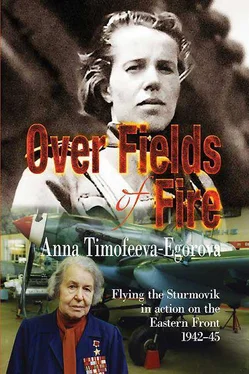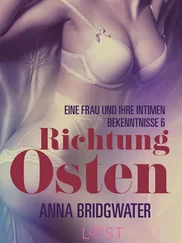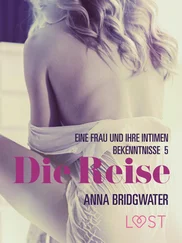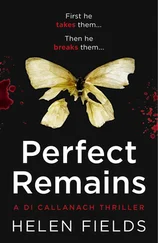It appeared that he had been in a hurry to see his wife and the daughter he had seen only on the day she was born. His wife had been writing him letters full of love and faithfulness and tracing on the paper sometimes the daughter’s hand, sometimes her foot. And here he was turned up at home — his wife opened the door and gasped… She didn’t want to let him in but the pilot burst into the house — there was a rear-area serviceman nursing his daughter… Turning into some kind of madness, our comrade shot him, grabbed his daughter and off he went to the train station. He made it to a big city, handed his daughter to an orphanage and rushed to catch up with his regiment. And here he was — come with cap in hand…
Investigators would later find out the rear-area man had not been killed, only slightly wounded: the bullet had hit his leg. The girl would be returned to her mother, our comrade would be demoted in rank but he would be still in combat. But in the meantime our ride went on and on…
Here we were in Tashkent. We called in at the oriental bazaar, buying there the famous dried apricots that were allegedly a cure for all possible diseases. But the main point was, they were said to make one young and beautiful. Sure, we were young but everyone without exception also wanted to be beautiful and that was why everyone was buying dried apricots. If one had no money he would borrow from his mates. I also bought Tashkent sultanas but they turned out to be merely dried grapes with pits.
When approaching Kuibyshev at the Grachevka Station we heard a Sovinformbureau communiqué from the loud-speakers: “The Southern grouping of the German troops under command of General Field-Marshal Paulus has capitulated. The Northern group has capitulated too”. This happened on 2 February 1943. It got noisy straightaway in our wagon: we rejoiced in the great success of our Army, shouted ‘hurray’. And one more thing — we were outraged that they had been so slow taking us to pick up our new planes. We had missed out on the Stalingrad fighting…
At last we arrived at the plant where we were to receive brand-new planes and fly them to the front. In expectation of the machines the pilots lodged in a huge dugout, as big as a Metrostroy tunnel, with two tiers of bunks. Here I received a letter from Raya Volkova, a Metrostroy girl. She wrote that the construction of the Moscow Metro was continuing, that the third-stage line with the stations ‘Sverdlov Square’, ‘Novokuznetskaya’, ‘Paveletskaya’, ‘Avtozavodskaya’, ‘Semyonovskaya’ would start operating soon. “At all stations”, she wrote, “there will be bas-reliefs on the walls with the inscription: ‘Constructed during the Great Patriotic War’. There’s a war on but we are in peaceful construction work. It’s true many Metrostroy men are building defensive installations as well. We’ve helped the men of Leningrad erect fortifications, laid out the Road of Life across Lake Ladoga… The guys from our aeroclub are all at the front. Your instructor Miroevskiy and Serezha Feoktistov are fighting in Sturmoviks . Vanya Vishnyakov, Zhenya Minshoutin and Serezha Korolev, in fighter planes. Louka Mouravistkiy, Vanya Oparin, Sasha Lobanov, Arkadiy Chernyshev, Vasya Kochetkov and Victor Koutov have been killed…”
“Victor who?..” I felt as if I had been struck by lightning — everything grew dark: there was neither sun, nor people, nor this war there… It seemed there was nothing to breathe, my eyes couldn’t see, my ears couldn’t hear. When I had come to my senses I saw Doctor Kozlovskiy above me with a syringe in his hand. He kept saying:
“Have a cry now, sweetheart, have a cry. You’ll feel better straightaway…” But I couldn’t cry. Something unbearably heavy lay on my heart and would not ease even for many long years after…
A kind soul, our doctor! He looked after me and healed my soul back in that hard time of mine. And not only mine… In the regiment there was no man more caring and attentive to us. Kozlovskiy literally looked after each airman: how and what he ate, how he slept, what his mood was. He always organised a Russian bath for us along with a change of underwear. He would pick some shack on a riverbank, skilful mechanics would put together a stove out of rocks, put on it a petrol drum, heat plenty of water — and the bathhouse was ready! Doctor Kozlovskiy always requested that a ‘tub’ be prepared for me — in other words a separate drum of hot water, and demanded insistently that I sit in it for no less than ten minutes. We airmen called our doctor ‘Specially for You’. And here’s why: when giving out to us chocolate or vitamins he would call each of us aside in turn, look around and say secretively: “Specially for you!” Wags among the pilots, catching sight of the Doctor, without pre-arrangement would pull chocolate out of their map-cases and yell all together: “Specially for you!” The doctor would take no offence and would do exactly the same at the next distribution of chocolates or vitamins. Kozlovskiy wouldn’t refuse medical help to anyone where we were based. I remember in Timashevka near Krasnodar I ran up to him with a request to help my billet-hostess and her baby when it was born: and snatching up everything necessary straightaway he rushed to save the mother and her baby. And this kind of thing happened many a time.
Our doctor once sent his wife a parcel along with a sergeant-major going via Moscow to Kuibyshev on service business. The sergeant-major found the hospital in which Kozlovskiy’s spouse worked. Worn out by the heat, he unbuttoned the collar of his blouse, took off his field-cap and sat in a chair in the hospital ward. Then the woman he was waiting for turned up. The sergeant-major stood up, staggered up to the woman and said, “Hello! I bring you your husband’s greetings from the front, and a present.”
“Why are you out of uniform? What sort of way is this to talk to someone senior in rank?” he heard her squeaky voice turning to a screech. The sergeant-major was taken aback. He sharply turned around, put the parcel on a table, put on his field-cap and silently left the building. When he came back to the regiment he wouldn’t upset the doctor, he just passed on greetings from his wife and added: “I handed the parcel over personally, don’t you worry!” The sergeant-major was maligned and mocked in the regiment for quite some time after that but it had nothing to do with our doctor. Him we respected…
There was always a long line in the plant canteen. When your turn came you would give them you ear-flapped hat and get an aluminium spoon. Our lunch would consist of three meals: ‘hasty’ soup, ‘shrapnel’ porridge and ‘blancmange à la raspberry’. The guys would joke: “You can survive on it, but will not chase the girls”.
Day in, day out we flew and pounded the ground — theoretically. We read whatever we could find about aerial and land battles, studied tactics: ours and the enemy’s. We had already been issued with flight maps. We would match them up and stick them together. Whole bedsheets were the result: we had a longish flight route to the front…
At Doctor Kozlovskiy’s insistent request I was shifted from the ninety-person communal house-dugout with three-tier bunks, into a Finnish hut. A room had been vacated there and the commanders offered it to me — after all, I was the only woman. But right in this cosy hut was where I almost perished. Once I came from the aerodrome chilled and saw that the stove had been thoroughly heated and the coals hadn’t gone out yet — they were playing beautifully with now blue, now red, now golden sparks. I feasted my eyes on them, warmed up, then swallowed some pill prescribed by our Doctor as a sedative, lay down on the bed, still dressed, and fell asleep. And here I was, asleep and I saw Victor, as if in reality, in a white shirt and tie. He has an embroidered Central Asian cap on his head. Then in a kind of mist I see myself in a pleated black skirt and a blue football jersey with white collar and laces. I have on a white beret, white plimsolls with blue edging, and white socks. The beret sits literally on the crown of my head and on my right ear — that was stylishness among us. All this magnificence had been acquired by me in the Torgsin 104 104 Translator’s note — abbreviation of the Russian words for ‘Trade With Foreigners’, a network of shops with luxury goods for foreigners and people possessing foreign currency and valuables in the pre-war USSR.
for an antique gold coin presented to me by my mum. And now, in dream as in waking, I saw in that Torgsin splendour not only myself but Victor too, with a tie he had never worn before. We were in the Sokolniki 105 105 Translator’s note — a recreation park in Moscow.
among daisies on some vast meadow. Victor picked me one daisy and said: “Here, tell your fortune: who do you like more — me or ‘Prince’ Tougoushy?”
Читать дальше












